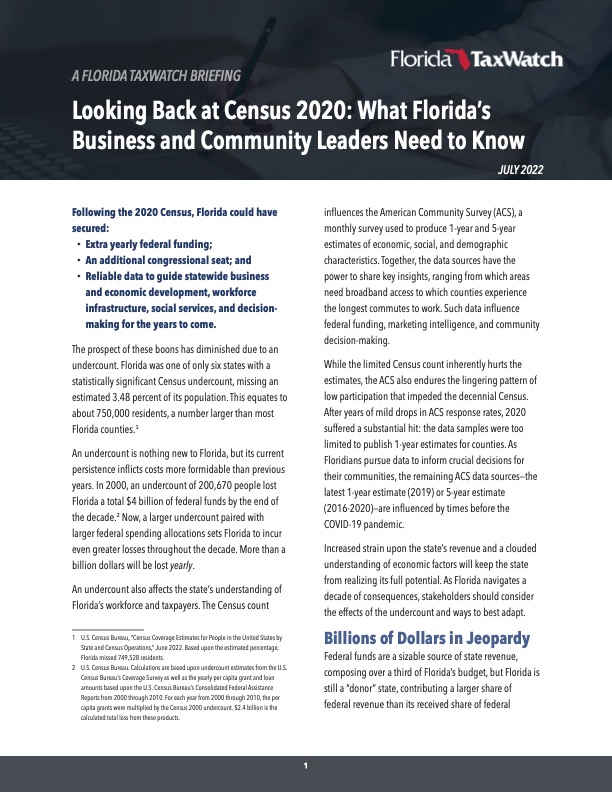Looking Back at Census 2020: What Florida’s Business and Community Leaders Need to Know
Want to know how the census undercount impacts Florida's Businesses? Sign up for our webinar: “Demographic Data for Businesses & the Census” on Wed., Aug. 31, please click here. Join FTW's efforts to secure more accurate data here.

Following the 2020 Census, Florida could have secured:
- Extra yearly federal funding;
- An additional congressional seat; and
- Reliable data to guide statewide business and economic development, workforce infrastructure, social services, and decision-making for the years to come.
The prospect of these boons has diminished due to an undercount. Florida was one of only six states with a statistically significant Census undercount, missing an estimated 3.48 percent of its population. This equates to 750,000 residents, a number larger than most Florida counties.
An undercount is nothing new to Florida, but its current persistence inflicts costs more formidable than previous years. In 2000, an undercount of 200,670 people lost Florida a total $4 billion of federal funds by the end of the decade. Now, a larger undercount paired with larger federal spending allocations sets Florida to incur even greater losses throughout the decade. Over a billion dollars will be lost yearly. Throughout the decade, Floridians can expect to lose between $11 billion and $21 billion.
An undercount also affects the state’s understanding of Florida’s workforce and taxpayers. Census data is applied to the American Community Survey (ACS)—a monthly survey that collects economic, social, and demographic characteristics—in order to establish yearly estimates that help describe the state’s residents. Together, the data sources have the power to share key insights, ranging from which areas need broadband access to which counties experience the longest commutes to work. Such data influence federal funding, marketing intelligence, and community decision-making.
In addition, Florida was expected to gain two congressional seats in the United States House of Representatives but only gained one. As a state known for booming growth, this is the first time since 1930 that Florida has gained fewer than two seats. While apportionment depends upon the populations of other states as well, one estimate shows Florida missing its second new seat by approximately 171,561 people, a number far below the state’s estimated undercount. Without the second seat, the power of a Florida voter is smaller than residents of other states, and as Florida continues its rapid growth, the power of each vote will decline from this low starting point.
Accurate population data is critical nationwide, but the stakes are especially high for a state like Florida. Florida is large and diverse, home to many of the country’s most hard-to-count populations, such as rural residents and children in poverty. The undercounted persons place an extra strain upon the state’s budget and further cloud projections as to what the state may need in order to accommodate all the people present at any given moment. Meanwhile, a complete count would equip Florida with additional federal funds, enabling the state to retain its own revenue for uses that can reinforce its rising economy.
Enhancing population data collection starts today with the ACS. By dedicating thoughtful research and facilitating opportunities for engagement, we hope to encourage unifying action that betters our great state. Securing a more accurate count needs attention from all Floridians, including business and community leaders, philanthropic organizations, government officials, and members of the public. Florida TaxWatch invites all to be part of a coalition that can help ensure Florida receives the fair funding, equal representation, and essential knowledge needed to reinforce the state’s economic growth and future trajectory.
To reflect upon the impact of population data collections, we ask you to consider the following:
- How may a Census undercount affect your community or industry?
- What supplemental data sources can help data users mitigate the knowledge lost by the 2020 Census undercount?
- What actions can be taken to secure a better Census count in 2030?
Visit FloridaTaxWatch.org/programs/Census-Institute or contact Meg Cannan at (850) 222-5052 to share your thoughts and learn more about Census-related topics.